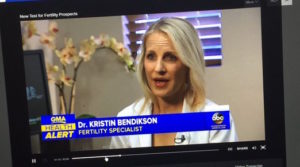Dr. Bendikson talks at PCRS 2016

Last week at the annual Pacific Coast Reproductive Society (PCRS) Meeting, I was asked by one of the genetics companies we work with to give a talk at one of their dinner events. Given my experience with social media, they wanted me to talk about how physicians can better use social media to provide greater awareness of fertility issues and facilitate communication with our infertile patients. I figured a fun way to address the topic would be to discuss “The 10 Most Common Mistakes Made with Social Media” (from a perspective of someone in the health care industry). I think I succeeded as the audience, full of doctors and industry representatives, seemed to have a blast.

My dinner presentation at PCRS 2016
One of my favorite entertaining pictures from the talk was this one. Clearly a surgeon should never operate while drinking and smoking, much less post on facebook about it.

On a More Serious Note
Social media can be a wonderful tool to educate patients and potential patients about their own health. With accurate knowledge, patients will be better informed to make better health care decisions for themselves and their partners.
I have noticed that there is a lot of misinformation pertaining to infertility, fertility treatments and pregnancy loss that is circulated on social media and the web.
One of the best online sources for accurate information about issues related to reproduction, women’s health and infertility is the American Society for Reproductive Medicine’s (ASRM) patient site called, ReproductiveFacts.org.
http://www.reproductivefacts.org/
This website is full of accurate, detailed and easy to understand information about infertility, fertility preservation, fertility diagnostic testing and egg donation as well as many other topics. On the website, they have links to current headlines trending in the reproductive field as well as links to ASRM news and research. You can find information through educational videos and fact sheets on almost every topic imaginable including, age and fertility, adoption, egg freezing and In Vitro Fertilization.
Health care professionals have a responsibility to guide their patients as to where they can best seek additional information if they want it, as they often do. I am happy that women and men suffering from infertility have a resource like the ASRM’s The ReproductiveFacts website to provide a trusted source of information on things related to fertility.



